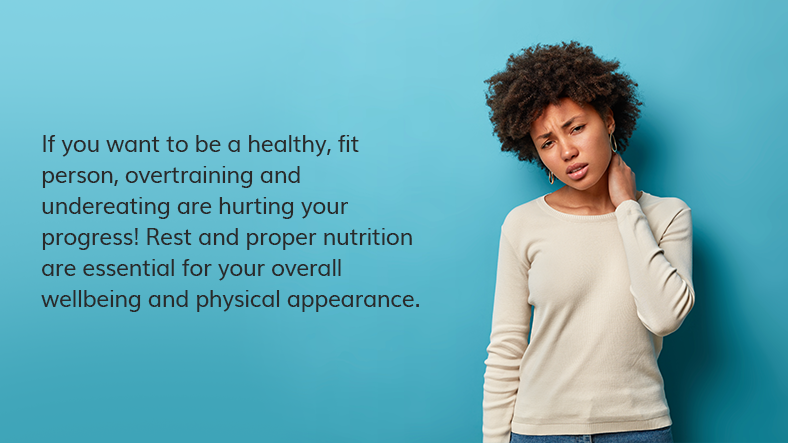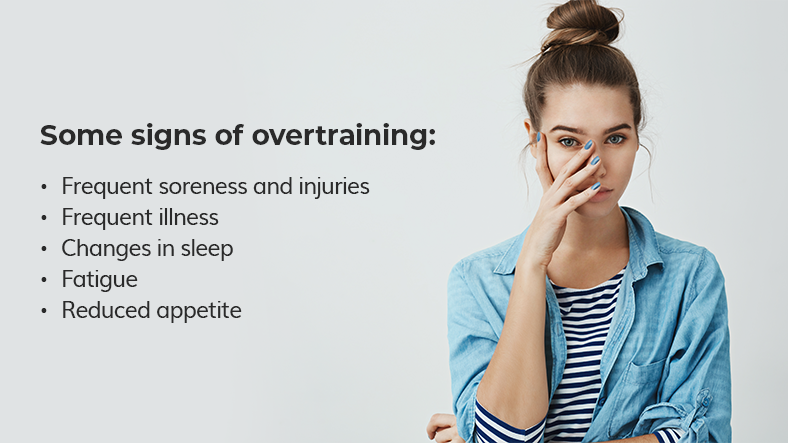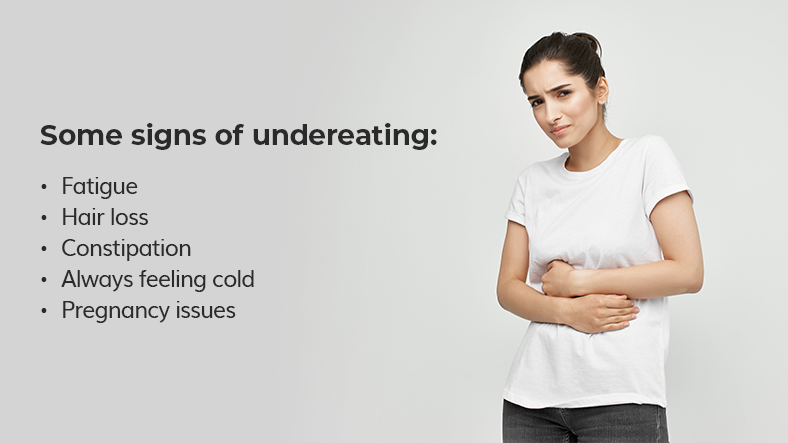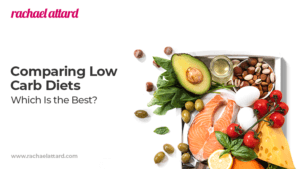What Happens When You Overtrain and Undereat

I love fitness and eating well, and I interact with so many girls who are passionate about it too! Working out and having a good diet have so many great side effects on your body and mental and emotional health!
However, some women find it challenging to know how much they should be working out or eating. Sometimes, they wind up overexercising and undereating. Some girls overexercise and undereat because they want to lose weight quickly or are trying to make extreme changes to their body composition. Other women feel carried away by fitness and don’t realize they are overdoing it. :)
Whatever the reason, training too much and eating too little can have severe consequences on your health and wellbeing. In this article, I’ll explain more about those consequences and how you could recover from overtraining and undereating.
What Happens When You Overtrain and Undereat?
Some of the Consequences of Overtraining
Working out is great for your body! In general, more exercise helps you improve your performance when you work out. Regular walks, for example, help you the next time you go for walk. Over time, your endurance, speed, and so on will improve.
However, the positive side effects of working out only work up to a certain point. After you reach that threshold, extra exercise can actually do you harm and hurt your progress! This mostly happens when you exercise a lot without much recovery time between workouts. If you do several days in a row of intense workouts, you’ll probably experience something called overtraining syndrome. This is basically your body’s way of telling you that you are burnt out!
Anybody can overtrain. Beginners, people who have been exercising for a while, and trained athletes all need to pay attention to their bodies and give themselves adequate rest!
Some of the consequences of overtraining include:
- A weakened immune system, making you more likely to get sick
- Osteoporosis and bone loss in women
- Heart damage, especially in extreme cases
- Poor exercise performance and stamina
- Fatigue and trouble sleeping
- Irritability
RELATED POST: Mistakes I’ve Made & What I’ve Learned
Some of the Consequences of Undereating
In a quest to be healthy or lose weight, many women cut back on calories. However, it can be easy to take this too far if you’re not careful. Undereating brings about serious problems, and you should be careful to make sure you’re eating enough healthy food! Being underweight can cause:
- Osteoporosis and bone weakness
- Nutritional deficiences
- Infertility
- Hormonal problems, including a loss of your period
- A weakened immune system
- Anemia
- Chronic fatigue
- Irritability
In addition to this, undereating can lower your metabolism. In fact, low-calorie diets can decrease the number of calories your body burns by almost 25 percent! The impact on your metabolism can last even after you stop the low-calorie diet.
RELATED POST: How to Have a Healthy Relationship with Food

Overtraining and Undereating Combined
As you might have noticed, many of the consequences of overtraining and undereating are very similar. Unfortunately, overtraining and undereating often go hand-in-hand. Each one is harmful on its own, but together they are even worse!
Remember, if you want to be a healthy, fit person, overtraining and undereating are hurting your progress! Rest and proper nutrition are essential for your overall wellbeing and physical appearance. :)
Also, some mental health professionals have noticed a link between overtraining, undereating, and mental health conditions, including eating disorders or anxiety. Perfectionism can also play a role in somebody’s desire to exercise a lot and restrict their calories. If you’re struggling mentally, consider reaching out to your doctor or a mental health professional to talk with them about this. :)
RELATED POST: The Effects of Constant Stress on Your Body
Signs You Are Overtraining
If you are concerned you might be overtraining, pay attention to these signs:
Soreness and Increased Number of Injuries
It’s normal to feel some muscle soreness after an intense workout or after doing an exercise that’s new for your body. Soreness is normally a sign that your body is repairing itself! If you’re feeling sore on a regular basis, there’s a good chance you are working out too hard or too often.
Overtraining can also lead to injuries, including:
- shin splints
- fractures
- plantar fasciitis
- soft tissue injuries
If you notice that your injuries keep coming back or they aren’t healing, you might also be working out too hard.
RELATED POST: Most Common Workout Injuries And How To Prevent Them
Getting Sick
Getting sick a lot, even with minor illnesses like the flu or a cold, is a sign you might be overtraining. Exercising too much can weaken your immune system and contribute to inflammation in your body. Both of these things can lead to regular sickness.

Sleep Changes
Normally, exercise helps you sleep better! But, if you notice you have trouble staying asleep or falling asleep, you might be overdoing your workouts. Too much exercise can stress your body out and make it hard to relax. It can also raise your cortisol levels, which contributes to restless sleep.
RELATED POST: What Happens to Your Body When You Don’t Sleep
Fatigue
Mental or physical fatigue can be a huge sign of overtraining. Feeling sluggish all day isn’t normal or healthy! Sometimes, it is better to skip exercise in order to get a good night of sleep!
Of course, you should feel a little tired after a healthy workout, but excessive fatigue occurs when your body isn’t able to recover after your workout. Feeling drained, especially right after a workout, is a sign you might be overdoing it.
FAT GAIN
When you overtrain, your cortisol levels can remain high. This can lead to fat storage, especially around your hips. High levels of cortisol can also make it really hard to lose excess fat!
Extra cortisol can also prevent the hormones in your body that help build muscle from doing their job. Loss of muscle can make it harder for your body to burn fat off.
Reduced Appetite
In most situations, exercise should make you hungry and increase your appetite! It is normal to want to eat a snack or a meal after exercising. After all, you just worked hard!
But overtraining can cause hormonal imbalances that make you less hungry. This, in turn, can cause you to undereat, which causes plenty of its own problems!
RELATED POST: How A Hormone Imbalance Can Cause Weight Gain
Signs You Are Undereating
Some of the most common signs of undereating include:
Fatigue
Eating too little will make you tired! Your body needs calories and nutrients to function properly. Breathing, thinking, and moving around all require nutrients!
Most people need at least 1,000 calories a day to perform basic functions. Adding physical activity can increase the number of calories you need by 1,000 calories or more.
Hair Loss
When you aren’t eating enough, your body has to decide what parts of your body to take care of. It will prioritize keeping your brain, heart, and other organs healthy, and your hair might suffer because of this.
Your body needs proteins, minerals, essential fatty acids, and vitamins to help your hair grow. Eating too little can also cause changes to your hair’s color or feeling.
Trouble Getting Pregnant
Your body relies on your hypothalamus and pituitary gland to keep your hormones balanced. This system is really sensitive to changes in your calories and body fat. If either of these becomes too low, the signals your brain is sending to the rest of your body can become damaged. This can impact your ability to get pregnant and limit your sex drive.
One sign that your hormones might be affected is a missing period, especially if you haven’t had it for three months or longer.
Always Feeling Cold
People who don’t eat enough often have lower levels of the T3 thyroid hormone. This hormone helps keep you warm.
Not eating enough calories can also cause your core body temperature to drop, making you feel cold all the time.
Mental Health Issues
Eating too few calories can make you irritable, but it can also cause more significant mental health issues. Studies show a correlation between people who undereat and those who have depression or anxiety.

Constipation
Eating a low-calorie diet can cause constipation. If you don’t eat enough, you might not be eating enough fiber, which helps you have frequent bowel movements. However, studies show that even people who eat enough fiber, struggle with constipation if they don’t undereat in general.
Always Hungry
If you’re not eating enough, your body will let you know! :) Pay attention to your hunger signals. If you’re constantly hungry, thinking about food, or noticing a grumbling in your stomach, you might not be eating enough.
Recovering From Overtraining and Preventing Overtraining
Recovery from overtraining can be difficult, especially if you love working out! Everybody is different, but people with extreme overtraining symptoms might need to take at least two weeks off of intense exercising. During this time, you can do gentle exercises and go for walks.
People with injuries that don’t heal or get worse over time should talk to their doctor. If you regularly have muscle, joint, or ligament pain that doesn’t go away after 24 hours, you should also talk to a doctor. They can assess your needs and help you develop a fitness plan that will work for your body.
If you think you’re at risk for overtraining, make sure you’re scheduling regular rest days, especially after intense workouts. It can take your muscles one to two days to recover after exercise, especially if you’re doing resistance or strength training. You can also:
- Take breaks throughout your workout to reduce the intensity of the routine
- Schedule active rest days with walks or light yoga
- Make sure you’re relaxing in other ways too, so your body is well-rested in general
If you’re struggling to eat enough, it’s important to try to increase your calories safely. Instead of eating foods that are high in sugar or are processed, try to:
- Make sure you are eating meals and snacks that include protein
- Picking complex carbohydrates, such as brown rice
- Looking for healthy sources of fat, such as nuts or avocados
- Eat veggies too!
Consider eating more frequently throughout the day too! Don’t be afraid to listen to your body’s hunger signals and eat a healthy snack between meals if you need. Eating after your workout is also important!
My Final Thoughts
Training excessively or undereating both cause serious problems on their own! If you are working out too much and eating too little at the same time, your body will really suffer. People have the best results when their diet and workouts are steady and sustainable for the long term!
In order to see excellent fitness results, stay healthy, and have good mental health, you need to make sure you’re eating enough and are careful to avoid working out too much. :)
Love Rachael Xx






